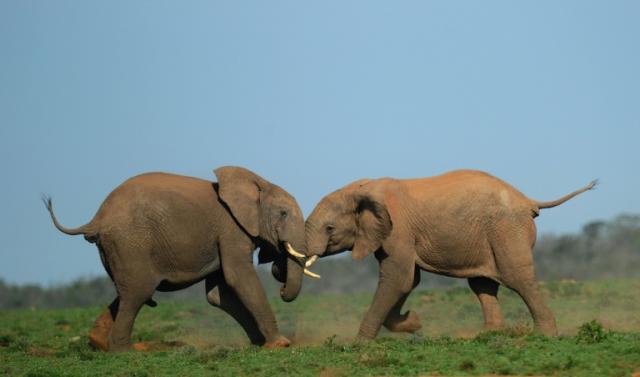Wind plant near the South African elephant preserve incenses protesters
Wildlife campaigners are furious over plans to develop wind farms close to a national park in South Africa because they fear the turbines will damage the scenery and harm elephants.
In the south of the country, close to the Addo Elephant National Park, more than 200 wind turbines are planned to be built after the Environment Ministry last year rejected a court attempt to halt the project.
The decision has angered environmental activists and tour operators, including wildlife veterinarian William Fowlds, who owns a lodge in the area and claims the farms threaten “the wild experience of going on a safari.”
He told AFP that “it’s catastrophic.”
“No one is saying we are against wind farms, but if you put them in a place with high eco-tourism value and high environmental value, you are actually harming the local ecology and the people who live there,” one person said.
Using solar and wind, the most industrialized economy in Africa is attempting to wean itself off coal, which now accounts for nearly 80% of the nation’s electrical production.
According to the environment ministry, approval for the construction of the wind farms was issued after an environmental impact assessment was finished.
Yet, the plan’s detractors are not persuaded.
Some people are worried that the turbine noise would disrupt the park’s 600 elephants, who use low frequency infrasounds to communicate.
This week, project opponents indicated they were thinking about taking additional legal action.
One of the firms involved in the project, the French company EDF, already operates a 60 megawatt wind farm 11 kilometers away from Addo Park, which is only one hour’s drive from Gqeberha, previously Port Elizabeth.
EDF told AFP that “(the farm) has been in operation since 2015 and that no concerns, issues, or frustrations have been raised by members of the public,” adding that it was still keeping an eye on the site’s biodiversity.
Further worries that turbulence from the turbines would interfere with small anti-poaching patrol aircraft were ignored by the corporation, which claimed that the national parks department “had not given any indication” that this might be a problem.
When AFP reached out for comment, other developers did not reply.
AFP



